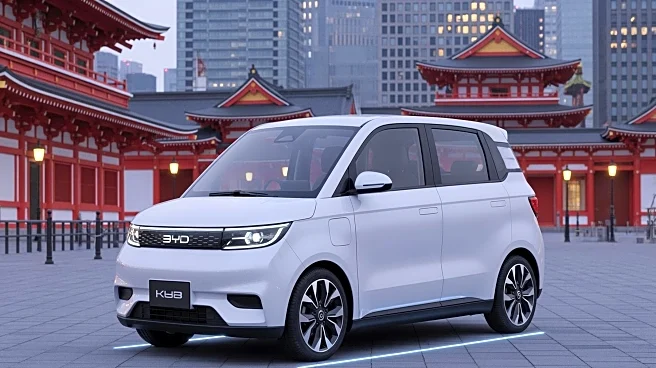What's Happening?
China's BYD has made a significant move into Japan's automotive market by introducing the RACCO K-EV at the 2025 Japan Mobility Show. This marks the first time a foreign automaker has entered Japan's kei
car segment, traditionally dominated by domestic brands like Suzuki, Daihatsu, Nissan, and Honda. The RACCO, designed specifically for the Japanese market, is a battery-electric vehicle that adheres to the kei car regulations, which include size and power limitations. The vehicle features BYD's Blade lithium iron phosphate battery, offering a range of approximately 180 km and supports DC fast charging up to 100 kW. The RACCO's introduction is part of BYD's broader strategy to expand its presence in Japan, the world's third-largest automotive market.
Why It's Important?
BYD's entry into the kei car market is significant as it challenges the long-standing dominance of Japanese automakers in this segment. Kei cars account for about 40% of new vehicle sales in Japan, making them a crucial part of the automotive landscape. By offering an electric alternative, BYD is pushing the market towards greater electrification, which could accelerate the adoption of electric vehicles in Japan. This move also highlights the increasing competition in the global automotive industry, as Chinese manufacturers leverage their expertise in electric vehicles to penetrate new markets. The success of the RACCO could influence Japanese automakers to prioritize electric vehicle development over hybrids, potentially reshaping the industry's future.
What's Next?
BYD plans to start pre-orders for the RACCO in the summer of 2026, with a competitive pricing strategy aimed at capturing market share. The company is also expanding its dealer network in Japan to enhance aftersales service, which is crucial for consumer acceptance. Japanese automakers are likely to respond by accelerating their own electric vehicle offerings in the kei car segment. The RACCO's performance in the market will be closely watched, as it could set a precedent for foreign automakers entering Japan's automotive industry. The broader implications for the industry include potential shifts in consumer preferences and increased focus on electric vehicle infrastructure development.
Beyond the Headlines
The introduction of the RACCO by BYD could have deeper implications for the Japanese automotive industry. It challenges the traditional perception of foreign-made vehicles in Japan, particularly those from China, which have faced skepticism regarding quality. BYD's commitment to extensive prototype testing and its focus on quality and service could help overcome these barriers. Additionally, the RACCO's success could influence cultural attitudes towards electric vehicles, encouraging younger consumers to prioritize technology and environmental considerations in their purchasing decisions. This development may also prompt Japanese automakers to reevaluate their strategies and invest more heavily in electric vehicle technology.










